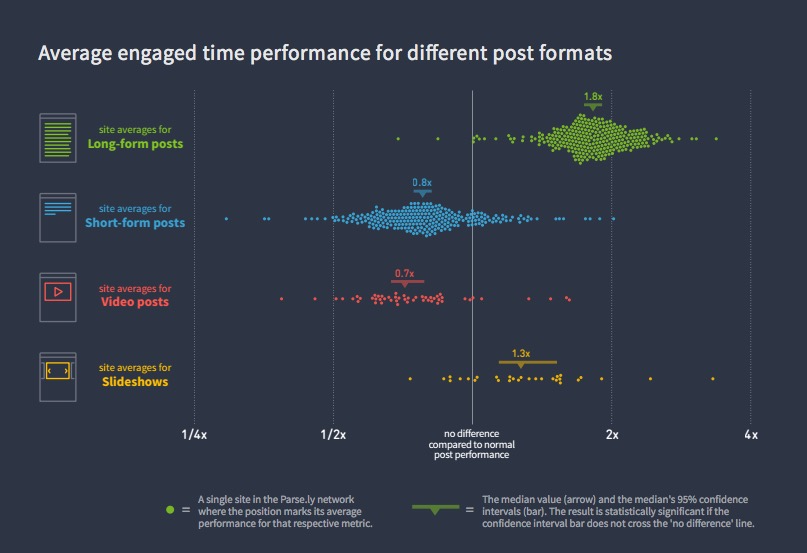The Great Unbundling
We’ve seen the different ways the internet unbundled print and music. TV is evolving, or at least unbundling, more slowly. Ben Thompson has been tracking this for some time. In his latest look he focuses on TV and how Facebook, Snapchat are contributing to its unbundling. This is not just about commercial TV but video and advertising in general. Read More
Speaking of video, just as Facebook is starting to pushing long form video…
Parse.ly finds users not that engaged with video
Parse.ly examined the performance of four types of posts within its network of 700 sites: long-form, short-form, video, and slideshows. Read More

The iPhone Unsung Sine Qua Non
Telecommunications companies have historically been masters of control, and their tight grip has often slowed down their own, and other industries’, progress. While Apple has some control issues of their own, their wresting substantial control from the carriers has opened up huge opportunities not just for them, but for everyone. Control, however, is never a permanent state, and shifts are often unforeseen.
In retrospect, the ascendency of Smartphone 2.0 and the way it has shaped our culture seems obvious and natural. But the celebration and contemplation overlooks a crucial Sine Qua Non, a necessary (but not sufficient) condition: Unlocking the carriers’ grip on handset specifications, marketing, and content distribution. Read More
Speaking of control…
The coming war between Apple and Facebook
Facebook has been phenomenally successful in mobile advertising. But they have long chafed at their dependence on the dominance of the only two mobile platforms that matter, Apple and Google. All three companies are jockeying for platform, content, and advertising control. Mobile marketing strategists need to track this, and Eric Seufert provides a rewarding deep dive that focuses on the Apple Facebook dance. Facebook is hoping messaging can replace operating systems as a more level platform battlefield. Read More
Speaking of messaging apps as platforms…
Tencent launches ‘mini programs’ for WeChat
WeChat is still leading the messaging-as-platform push and are who to watch first. Even though they “only” have some 800 million users in China they may lead in engagement time. WeChat ‘mini programs’ compete with Google ‘instant apps’, all app stores, and of course Facebook Messenger and other messaging products. Read More
Blockstack’s Vision to Reinvent the Web for Better Privacy
Based on blockchain technology as you might guess. The approach is one to watch and there are many companies working on it.
…instead of needing to create accounts with each site, as people do with Google or Facebook, users of sites built on Blockstack’s system will control their own digital identity (or identities). To use a site that needs your information, you will grant access to a profile under your control alone. If you want to stop using a service, you can revoke its access to your profile and data and take it elsewhere. Read More
Also…
On Their Tenth Anniversary, Mobile Apps Start Eating Their Own and of course are also threatened by ‘mini programs’, ‘instant apps’ and bots. via Flurry Analytics
On Medium 1: Jessica Lessin… What Everyone Is Missing About Media Business Models via The Information
On Medium 2: Frederic Filloux… A New Model for Medium via Monday Note
Would be fascinating to have comparable survey of U.S citizens… 70% of Europeans Aren’t Willing to Sacrifice Privacy for New Services, Survey Reveals via Tripwire
I love quiet, but there is a cost. Think about this… Our Silent Future via The Information
Businesses are people too! and deserve a good CX and DX… Measuring B2B’s digital gap via Mckinsey
The Gilbane Advisor curates content for our community of content, computing, and digital experience professionals. Subscribe to our newsletter, or our feed.

